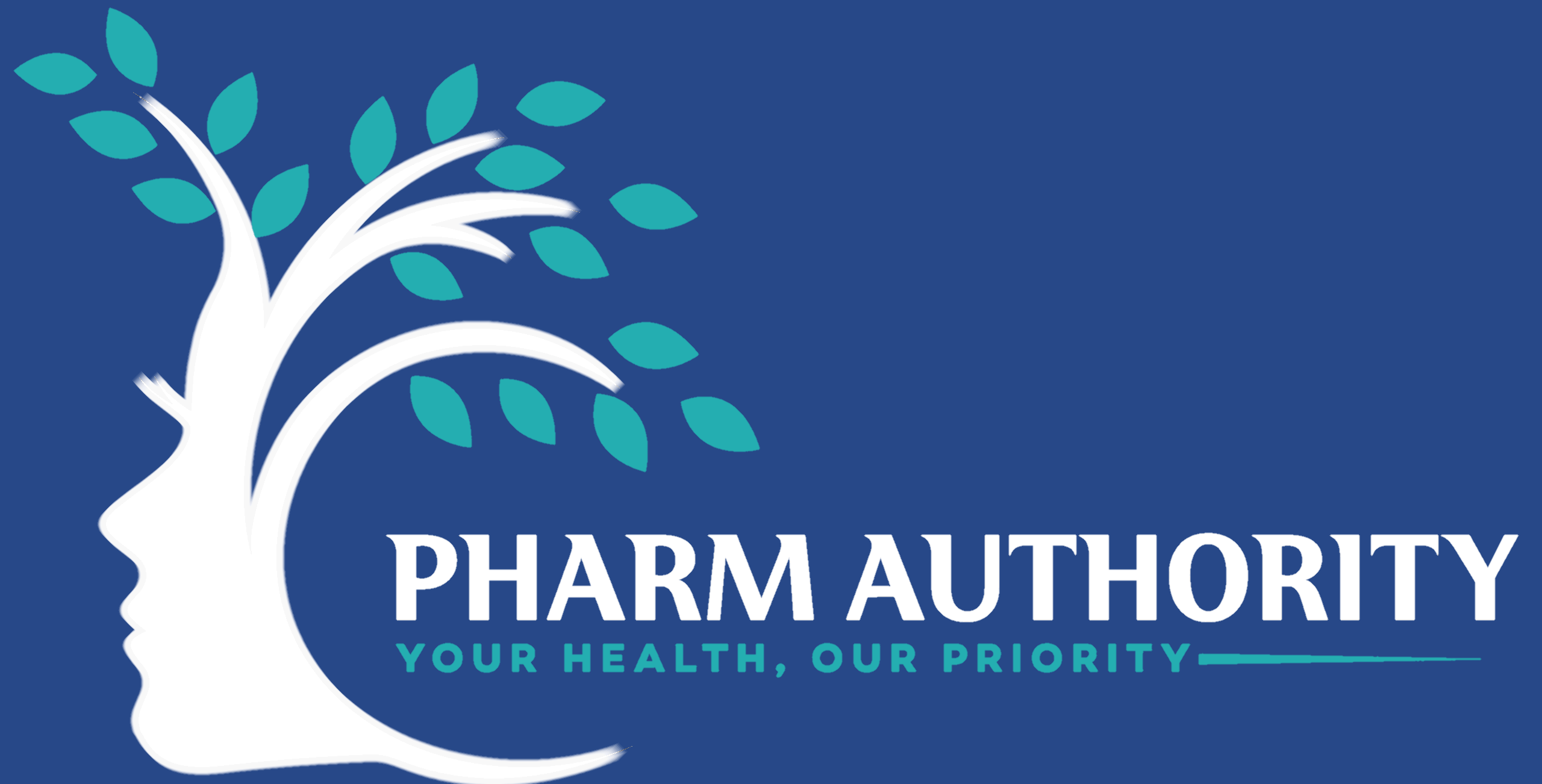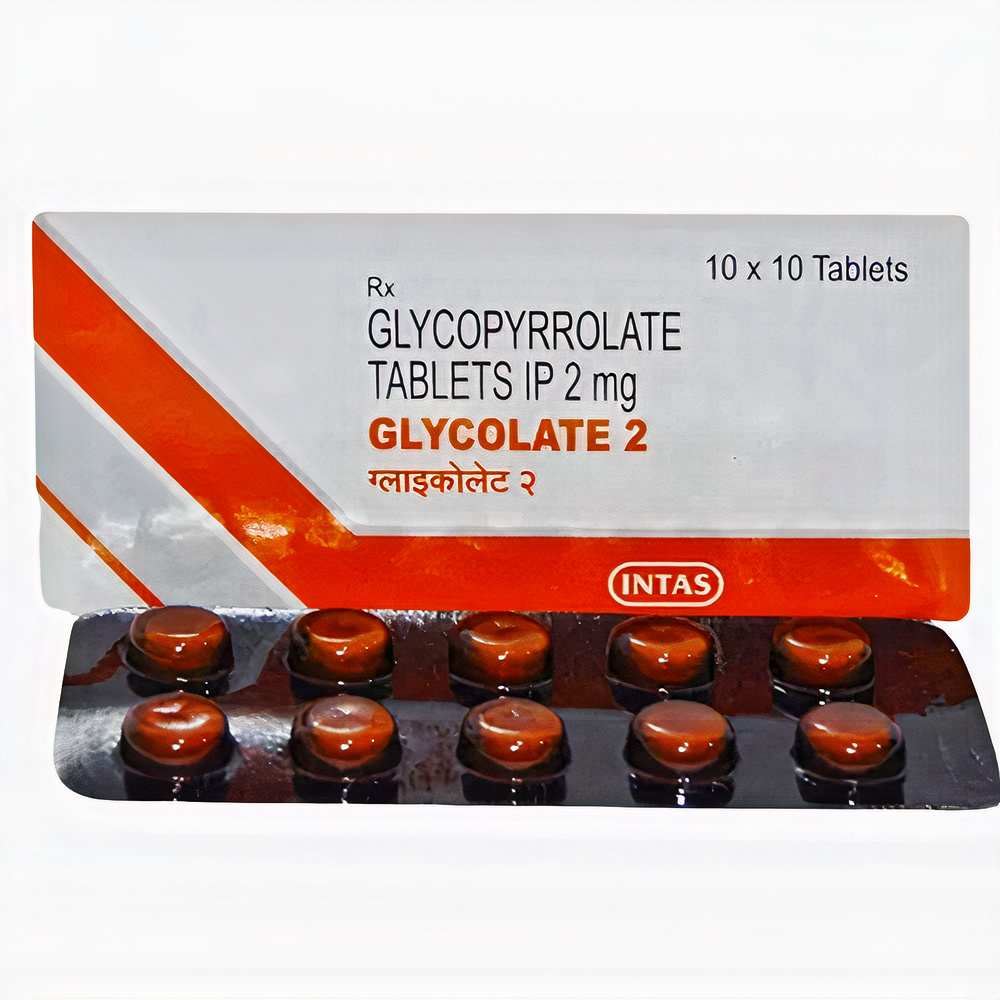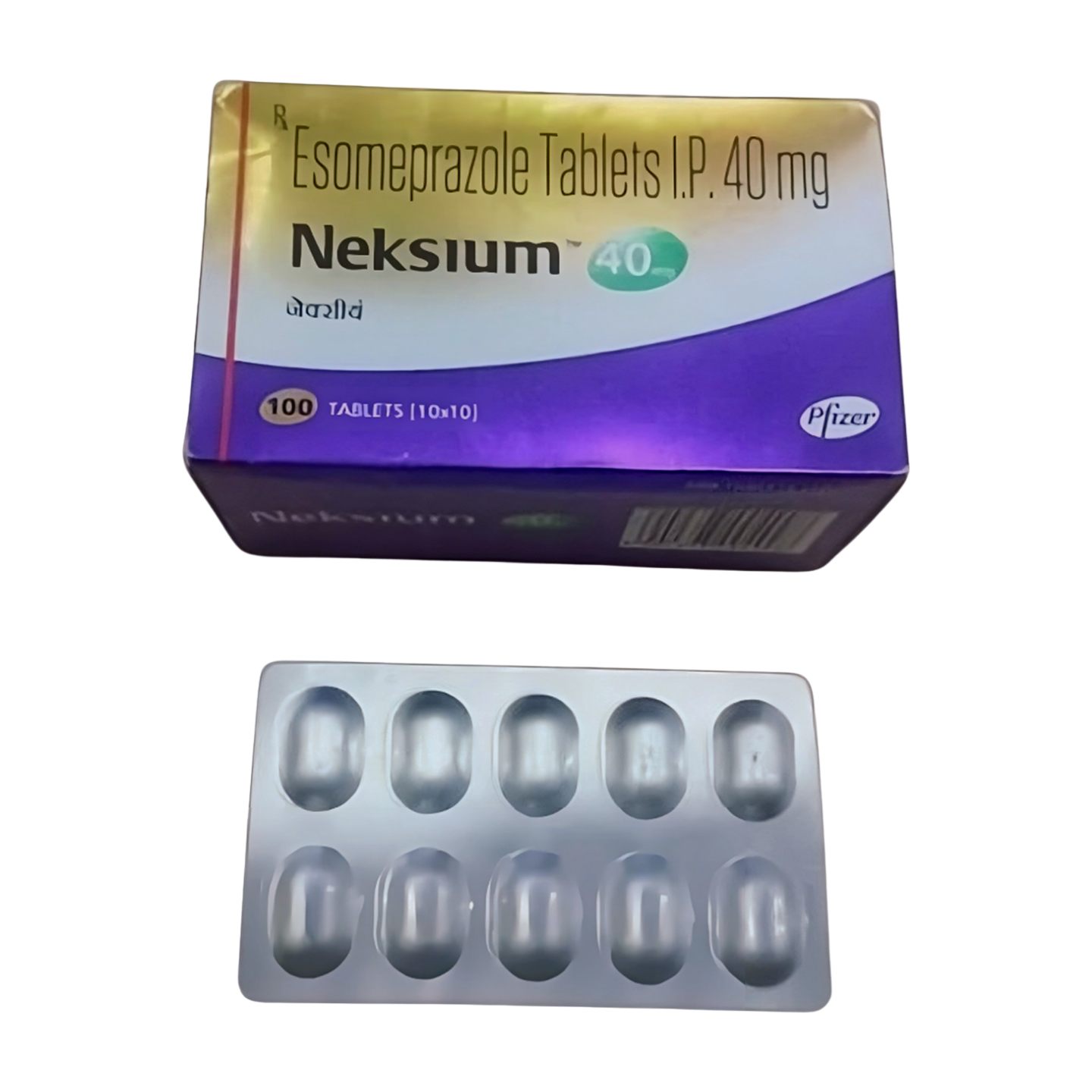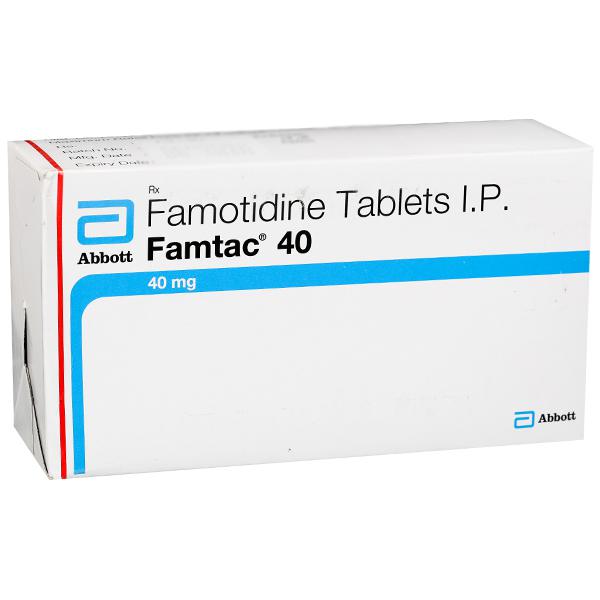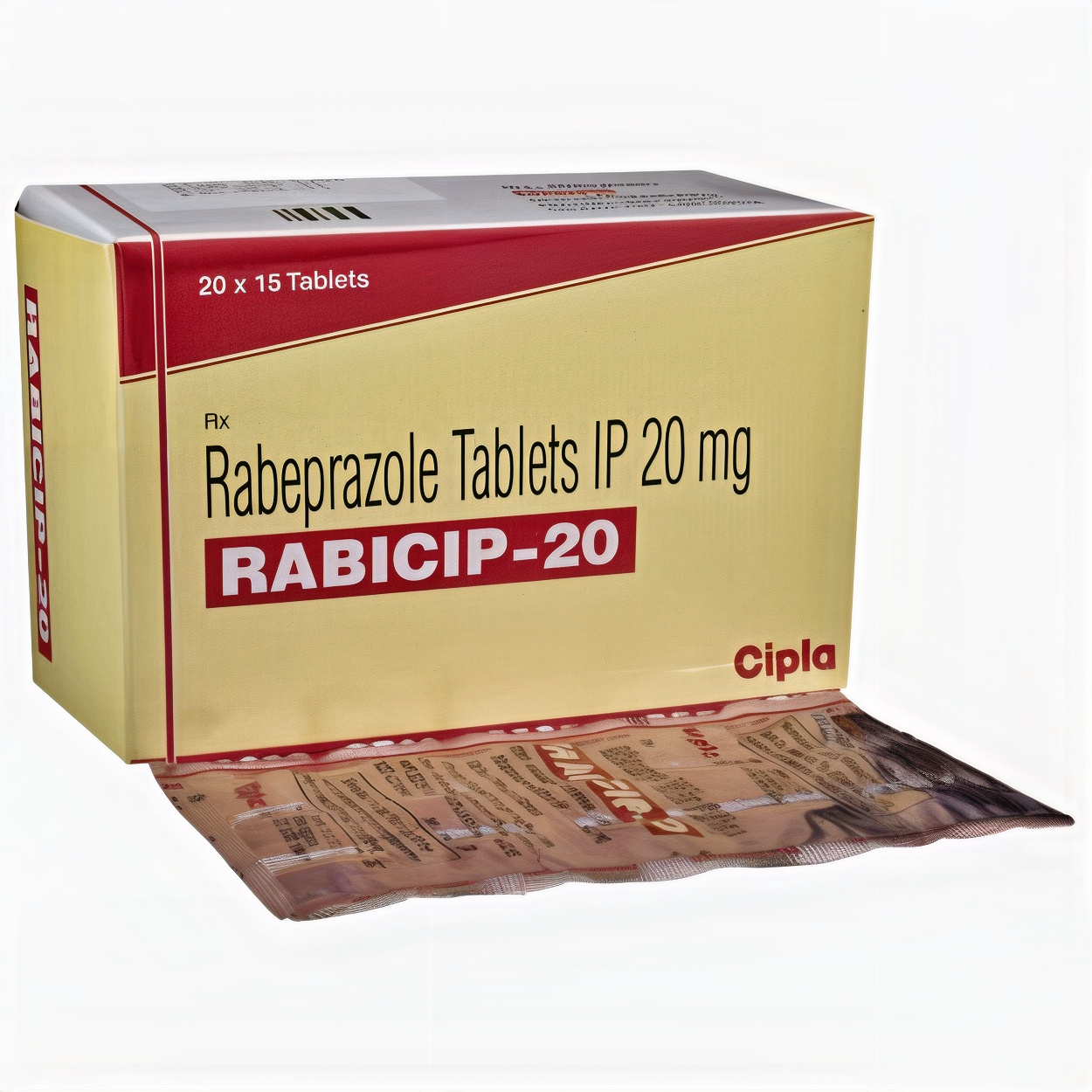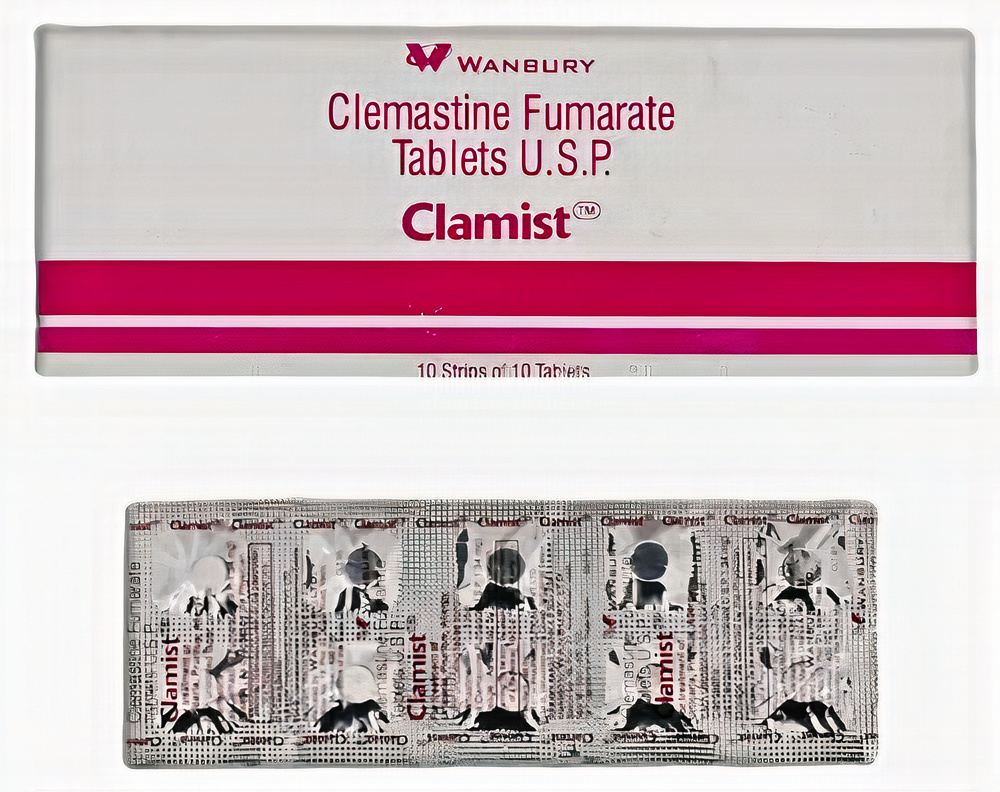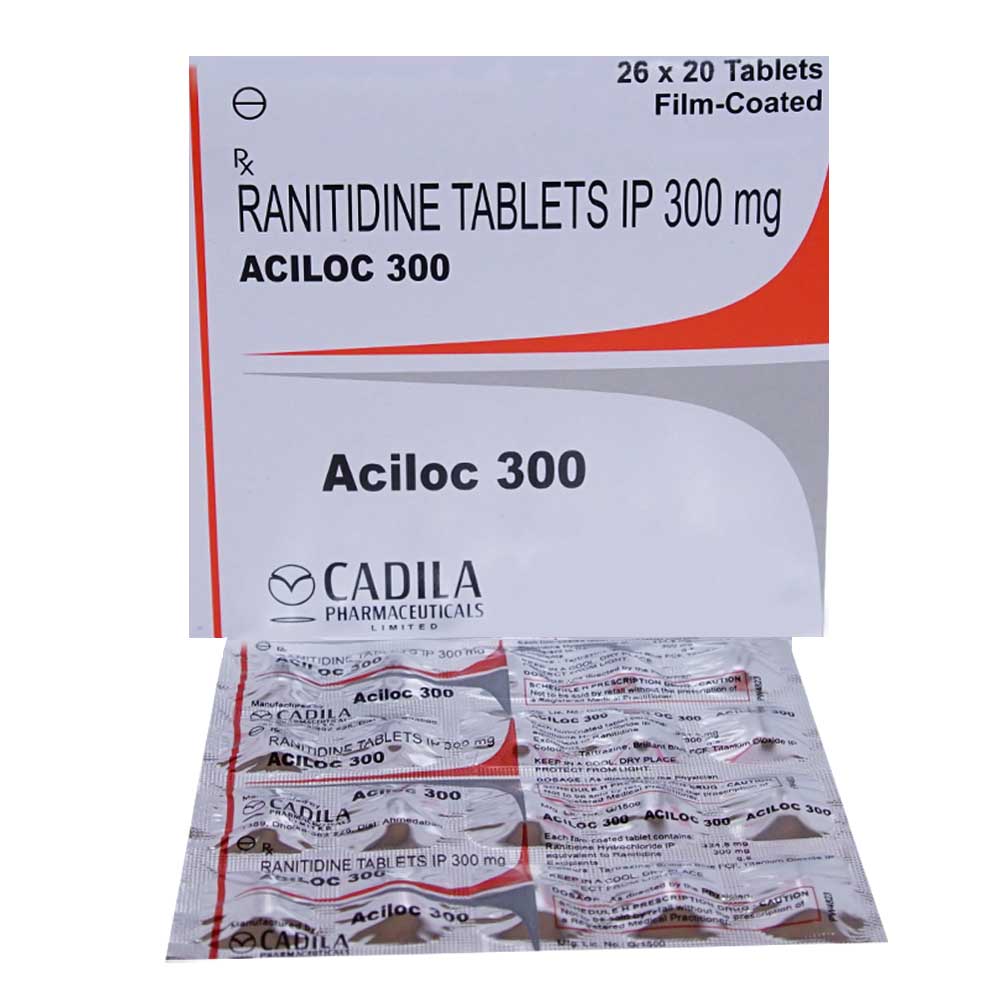Description
Glycolate 2 Tablet (Glycopyrrolate 2mg)
Glycolate 2 Tablet (Glycopyrrolate 2mg) is a prescription medication designed to manage and treat peptic ulcers. This medicine exhibits anti-secretory properties, effectively reducing excess salivation and sweating. Additionally, it can be utilized pre-operatively to minimize body secretions. The tablet can be taken with or without food, and it is crucial to follow the dosage and duration recommended by your doctor to avoid recurrence or worsening of symptoms.
Uses Of Glycolate 2 Tablet (Glycopyrrolate 2mg)
- Treatment of Peptic ulcer disease
- Reduction of excessive salivation
- Control of sweating
- Pre-operative reduction of body secretions
- Management of certain gastrointestinal disorders
Treatment of Peptic ulcer disease: Peptic ulcers are painful sores that develop in the inner lining of the stomach or intestines. Glycolate 2 Tablet (Glycopyrrolate 2mg) helps by reducing stomach acid production, which allows the ulcers to heal naturally and minimizes further damage.
Reduction of excessive salivation: This medication effectively reduces excessive salivation by blocking acetylcholine, a chemical messenger responsible for stimulating saliva production.
Control of sweating: Glycolate 2 Tablet (Glycopyrrolate 2mg) is also used to manage hyperhidrosis, a condition characterized by excessive sweating.
Pre-operative reduction of body secretions: Before surgeries, this tablet may be employed to reduce secretions, ensuring a safer and cleaner operative procedure.
Management of certain gastrointestinal disorders: Glycolate 2 Tablet (Glycopyrrolate 2mg) is also prescribed to manage specific gastrointestinal conditions that benefit from reduced acid and secretion production.
Safety & Precautions
- Consult your doctor before consuming alcohol with Glycolate 2 Tablet (Glycopyrrolate 2mg).
- Generally considered safe during pregnancy, but consult your doctor.
- Likely safe during breastfeeding; however, it may reduce milk production with prolonged use.
- Avoid driving, as it may impair your vision and coordination.
- Use cautiously if you have kidney disease; dosage adjustment may be required.
- Consult your doctor if you have liver disease before using this medication.
- Inform your doctor about all other medications you are taking.
- Do not stop the medication abruptly without your doctor’s advice.
- Eat adequate fiber and drink plenty of water to prevent constipation.
- Regular follow-ups with your doctor are advisable while on this medication.
Side Effects
Most side effects do not require any medical attention and disappear as your body adjusts to the medicine. Consult your doctor if they persist or if you’re worried about them.
- Dryness in mouth
- Flushing (sense of warmth in the face, ears, neck, and trunk)
- Vomiting
- Constipation
- Blurred vision
- Drowsiness
- Increased heart rate
- Urinary retention
- Dizziness
- Headache
- Insomnia
- Abdominal pain
- Nausea
- Loss of taste
- Fatigue
FAQ
Can I take Glycolate 2 Tablet (Glycopyrrolate 2mg) with other medications?
It is essential to inform your doctor of all medications you are currently taking. Some drugs may interact with Glycolate 2 Tablet (Glycopyrrolate 2mg), potentially altering its effectiveness or increasing the risk of adverse side effects. Your doctor can provide guidance on safe medication combinations.
How long do I need to take Glycolate 2 Tablet (Glycopyrrolate 2mg)?
The duration of your treatment will be determined by your doctor based on your condition. It is crucial to follow your doctor’s recommendations and complete the prescribed course, even if you start feeling better. Stopping the medication too early may lead to a recurrence or worsening of your symptoms.
What should I do if I miss a dose of Glycolate 2 Tablet (Glycopyrrolate 2mg)?
If you miss a dose, take it as soon as you remember. If it is almost time for your next dose, skip the missed dose and proceed with your regular dosing schedule. Do not take two doses simultaneously to make up for the missed one.
Can I drive or operate heavy machinery while taking Glycolate 2 Tablet (Glycopyrrolate 2mg)?
Glycolate 2 Tablet (Glycopyrrolate 2mg) may cause side effects such as blurred vision and dizziness, which can impair your ability to drive or operate heavy machinery. It is advisable to avoid such activities until you know how the medication affects you.
Is Glycolate 2 Tablet (Glycopyrrolate 2mg) safe during pregnancy and breastfeeding?
Glycolate 2 Tablet (Glycopyrrolate 2mg) is generally considered safe during pregnancy and breastfeeding. However, it is best to consult your doctor before using this medication. Prolonged use during breastfeeding might reduce milk production.
How should I store Glycolate 2 Tablet (Glycopyrrolate 2mg)?
Store Glycolate 2 Tablet (Glycopyrrolate 2mg) below 30°C, away from direct sunlight and moisture. Keep it out of reach of children and pets. Follow the storage guidelines mentioned on the packaging or provided by your pharmacist.
Additional Information: Glycopyrrolate Usage Guidelines
Dosages for Various Conditions
Glycopyrrolate is an essential medication used for several conditions, including preoperative and intraoperative care, reversal of neuromuscular blockade, and as an adjunct in the treatment of peptic ulcers and drooling in pediatric patients. Dosages vary significantly based on the specific condition being treated.
Adult and Pediatric Dosages
| Formulation | Strength | Brand Name |
|---|---|---|
| Tablets | 1 mg, 1.5 mg, 2 mg | Generic, Robinul, Robinul Forte |
| Tablet, oral disintegrating | 1.7 mg | Dartista ODT |
| Oral solution | 1 mg/5mL | Cuvposa |
| Injectable solution | 0.2 mg/mL | — |
Surgery:
- Adult Dosage:
- Preoperative: 4 mcg/kg IM 30-60 minutes before surgery.
- Intraoperative: 0.1 mg IV; may repeat every 2-3 minutes.
- Pediatric Dosage:
- Preoperative (1 month to 2 years): 4-9 mcg/kg IM 30-60 minutes before anesthesia or when preanesthetic opioid and/or sedative administered.
- Preoperative (older than 2 years): 4 mcg/kg IM 30-60 minutes before surgery.
- Intraoperative: Repeat every 2-3 minutes; not to exceed 0.1 mg.
Neuromuscular Blockade Reversal:
- Adult Dosage: 0.2 mg IV per 1 mg of neostigmine or 5 mg of pyridostigmine administered.
- Pediatric Dosage: 0.2 mg IV per 1 mg of neostigmine or 5 mg of pyridostigmine administered.
Adjunct to Treatment of Peptic Ulcer:
- Adult Dosage: 1.7 mg orally twice or three times daily; not to exceed 6.8 mg per day.
Drooling (Pediatric Patients):
- Age Group: 3-16 years
- Dosage: 0.02 mg/kg orally every 8 hours initially; may increase by 0.02 mg/kg every 5-7 days if warranted, up to 0.1 mg/kg every 8 hours. Not to exceed 1.5-3 mg/dose (based on weight; see manufacturer instruction).
- Safety and efficacy not established for children younger than 3 years.
Drug Interactions
Glycopyrrolate interacts with several drugs, ranging from severe to minor interactions. It’s crucial to inform your healthcare provider about all the medications you are taking, including prescription drugs, over-the-counter medications, and herbal products.
Severe Interactions
- Umeclidinium bromide/vilanterol inhaled
Serious Interactions
- Glucagon
- Glucagon intranasal
- Glycopyrronium tosylate topical
- Macimorelin
- Pramlintide
- Revefenacin
- Secretin
Moderate Interactions
Glycopyrrolate has moderate interactions with at least 94 other drugs. Some commonly encountered medications in this category include:
- Anticholinergic agents
- Opioid analgesics
- Antihistamines
- Tricyclic antidepressants
Minor Interactions
Glycopyrrolate has minor interactions with at least 12 other drugs. While these interactions are generally less significant, they still need to be considered.
Checking for Interactions
To ensure safety, use tools like the RxList Drug Interaction Checker and always consult your healthcare provider or pharmacist for advice on potential interactions.
Considerations for Specific Populations
Hepatic and Renal Impairment
Individuals with hepatic impairment should use glycopyrrolate with caution due to potential changes in drug metabolism. Similarly, patients with renal impairment may require dose adjustments to prevent urinary retention and related complications. Proper medical evaluation is essential before starting glycopyrrolate in these populations.
Autonomic Neuropathy and Hyperthyroidism
Patients with autonomic neuropathy or hyperthyroidism should also exercise caution when using glycopyrrolate. The drug may exacerbate specific symptoms related to these conditions, necessitating close monitoring by healthcare providers.
Prostatic Hyperplasia and Bladder Neck Destruction
Men with prostatic hyperplasia or bladder neck destruction need careful evaluation before using glycopyrrolate. The drug can worsen urinary retention, complicating these existing health issues.
Contraindications
Glycopyrrolate is contraindicated in individuals with certain medical conditions and hypersensitivities. Ensuring eligibility is critical to avoid severe complications.
Conditions that preclude using glycopyrrolate include:
- Hypersensitivity to glycopyrrolate or other ingredients.
- Angle-closure glaucoma.
- Obstructive uropathy and GI obstruction.
- Paralytic ileus and intestinal atony in elderly or debilitated patients.
- Unstable cardiovascular status in acute hemorrhage.
- Severe ulcerative colitis and toxic megacolon.
- Myasthenia gravis.
- Reflux esophagitis and hiatal hernia.
- Mitral stenosis.
Additionally, concomitant use of solid oral dosage forms of potassium chloride is contraindicated.
Usage in Pediatric Patients
Pediatric patients, particularly those with spastic paralysis, may exhibit an increased response to glycopyrrolate, heightening the potential for adverse effects. Paradoxical reactions characterized by hyperexcitability can also occur in children taking large doses. Therefore, extreme caution is advised when prescribing this medication to pediatric populations.
Furthermore, the parenteral product contains benzyl alcohol, which is generally avoided in neonates due to potential toxicity.
Heat Prostration and Mental Alertness
Individuals using glycopyrrolate should be cautious about heat prostration, especially during fever, high ambient temperature, or physical exercise. The medication may also impair mental abilities to perform tasks requiring alertness, such as operating heavy machinery or driving.
Monitoring and Follow-Up
Regular monitoring and follow-up appointments with healthcare providers are crucial to ensure the safe and effective use of glycopyrrolate. Patients should report any unusual symptoms or side effects promptly to their healthcare provider to facilitate timely intervention.
Patients and caregivers are encouraged to keep a detailed list of all medications being taken and share this list with healthcare providers during each visit. This practice helps in identifying potential drug interactions and ensuring optimal treatment outcomes.
Conclusion
Glycopyrrolate is a versatile medication used for various medical conditions, notably during surgical procedures and in managing peptic ulcers and drooling in pediatric patients. However, its usage requires careful consideration of dosages, potential drug interactions, and specific patient populations. Adherence to medical advice and proper monitoring are essential to maximize the therapeutic benefits and minimize risks associated with this medication.
Always consult your healthcare provider or pharmacist for personalized advice and information regarding glycopyrrolate to ensure its safe and effective use.
Citations:
- FDA. (n.d.). Glycopyrrolate. Retrieved from [FDA website](https://www.fda.gov)
- RxList. (n.d.). Glycopyrrolate – FDA prescribing information, side effects, and uses. Retrieved from [RxList](https://www.rxlist.com).
- PubMed Health. (n.d.). Glycopyrrolate. Retrieved from [PubMed](https://pubmed.ncbi.nlm.nih.gov).
